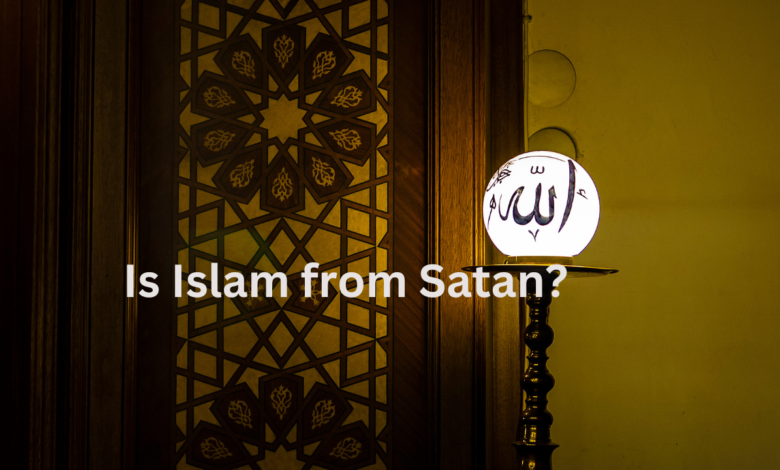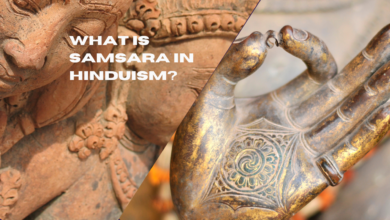Is Islam from Satan?
Separating Fact from Fiction about Islam's Origins and Teachings

Is Islam from Satan?
Islam is a monotheistic Abrahamic religion founded in the 7th century CE in the Arabian Peninsula. Its followers, known as Muslims, believe in one God (Allah in Arabic) and follow the teachings of the Prophet Muhammad as revealed in the Quran.

Introduction
Throughout history, different religions and belief systems have often been met with skepticism and even hostility. Unfortunately, Islam, one of the world’s major religions, has not been immune to such scrutiny. Some individuals, driven by prejudice or misunderstanding, have claimed that Islam is from Satan or that it promotes evil. In this article, we will examine this misconception and provide a balanced perspective on Islam’s origins and teachings.
The Origins of Islam
To understand the accusation that Islam is from Satan, it’s crucial to examine the religion’s origins. Islam emerged in the 7th century CE in the Arabian Peninsula, with its prophet, Muhammad, receiving revelations from God (Allah in Arabic) through the Angel Gabriel. These revelations were compiled into the Quran, Islam’s holy book, which is believed by Muslims to be the literal word of God.
Prophet Muhammad’s life and mission were characterized by a call to monotheism, social justice, and ethical conduct. He advocated for the fair treatment of orphans and widows, spoke against the exploitation of the poor, and emphasized the importance of compassion, mercy, and forgiveness. These values do not align with the characteristics typically associated with Satan or evil.
Also check.
- What is Shirk in Islam
- Who are Kiraman Katibin in Islam?
- When was the Prophet Muhammad born?
- What did Prophet Muhammad say about Jesus Christ?
- What is difference between Sunni and Shia?
Islamic Teachings
Islam’s core teachings revolve around the Five Pillars, which include the declaration of faith, prayer, charity, fasting, and pilgrimage. These principles are aimed at guiding Muslims toward a virtuous life, one that fosters compassion, self-discipline, and social responsibility.
One of the most misunderstood aspects of Islam is Jihad. While some extremists have misused this term to justify violence, the concept of Jihad, in its true form, means “struggle” or “striving.” It can refer to an internal struggle against one’s own flaws or an external struggle for justice and self-defense. It does not inherently promote violence or evil.
The Quran’s Message
The Quran, as the foundational text of Islam, contains verses that cover a wide range of topics, including morality, guidance for personal conduct, and social justice. While there are verses related to warfare and self-defense, these must be understood in their historical context and within the framework of Islamic ethics, which prohibit the killing of non-combatants, the use of excessive force, and acts of terrorism.
The Quran also emphasizes the importance of religious tolerance. It acknowledges the existence of other faiths and emphasizes that there is no compulsion in religion (Quran 2:256). This principle contradicts the idea that Islam seeks to impose itself through force or coercion.
Misconceptions and Stereotypes
Accusations that Islam is from Satan often arise from misinterpretations of Islamic texts or actions of a minority of extremists. It is important to recognize that no religion, including Islam, is immune to individuals who may use it as a cover for their own political or personal agendas.
Furthermore, it is crucial to avoid generalizations that attribute the actions of a few extremists to an entire religion or its followers. Millions of Muslims around the world practice their faith peacefully and contribute positively to their communities.
Conclusion
In conclusion, the claim that Islam is from Satan is a misconception that arises from misunderstandings, misinterpretations, and prejudiced views. Islam’s origins, teachings, and core principles emphasize monotheism, morality, social justice, and compassion. Accusations to the contrary fail to consider the complexities and nuances of the religion.
It is essential to engage in informed and respectful dialogue when discussing any religion or belief system. Rather than perpetuating stereotypes and baseless accusations, fostering understanding and promoting religious tolerance can help bridge the gap between different faiths and contribute to a more harmonious world.
FAQs
What is Islam?
Islam is a monotheistic Abrahamic religion founded in the 7th century CE in the Arabian Peninsula. Its followers, known as Muslims, believe in one God (Allah in Arabic) and follow the teachings of the Prophet Muhammad as revealed in the Quran.
Who was Prophet Muhammad?
Prophet Muhammad is considered the final prophet in Islam. He received revelations from God through the Angel Gabriel, which were later compiled into the Quran. He is also revered for his exemplary character and moral teachings.
What is the Quran?
The Quran is the holy book of Islam, believed to be the literal word of God as revealed to Prophet Muhammad. It serves as the primary source of guidance for Muslims in matters of faith, morality, and conduct.
What are the Five Pillars of Islam?
The Five Pillars of Islam are the core principles of the faith, including the declaration of faith (Shahada), prayer (Salat), charity (Zakat), fasting during Ramadan (Sawm), and pilgrimage to Mecca (Hajj).
What is Jihad in Islam?
Jihad in Islam is often misunderstood. It means “struggle” or “striving” and can refer to an internal spiritual struggle or an external struggle for justice and self-defense. It does not inherently promote violence.
Does Islam promote violence or terrorism?
No, Islam as a religion does not promote violence or terrorism. Acts of terrorism carried out by extremist groups do not represent the beliefs and values of the majority of Muslims.
How does Islam view other religions?
Islam acknowledges the existence of other religions and emphasizes religious tolerance. The Quran states that there is no compulsion in religion, and Muslims are encouraged to coexist peacefully with people of different faiths.
What are some common misconceptions about Islam?
Common misconceptions about Islam include the idea that it is a violent religion, that Muslims are terrorists, or that it seeks to impose its beliefs on others. These misconceptions are not supported by the religion’s core teachings.
Are women oppressed in Islam?
To learn more about Islam, consider reading books on the subject, visiting mosques, and engaging in open and respectful discussions with Muslims. It’s essential to approach the topic with an open mind and a willingness to understand diverse perspectives.




